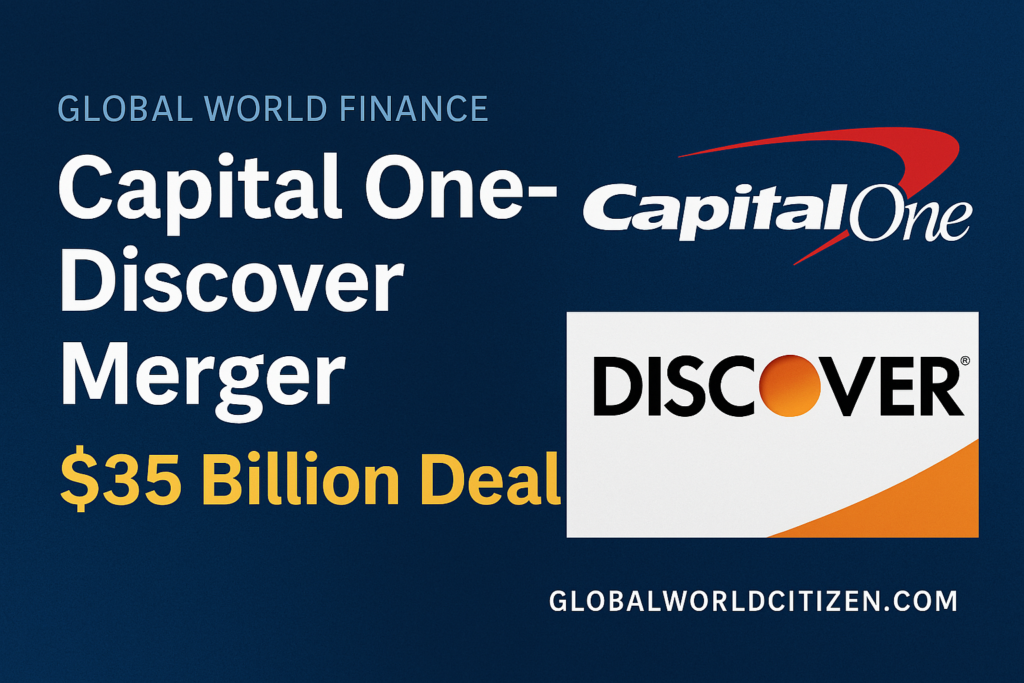Published: April 4, 2025
 By: Global World Finance Desk
By: Global World Finance Desk
 Source: GlobalWorldCitizen.com/Finance
Source: GlobalWorldCitizen.com/Finance
In a landmark $35 billion merger, Capital One is poised to acquire Discover Financial Services, marking a transformational moment in global finance, credit card innovation, and digital banking infrastructure. With regulatory approvals underway, this deal could reshape the future of credit cards — not just in the United States, but across the world.
 Why This Credit Card Merger Matters Globally
Why This Credit Card Merger Matters Globally
The Capital One–Discover merger isn’t just a headline for Wall Street — it’s a signal of a global shift in financial services, payment networks, and access to credit in emerging markets.
If completed, the merger would:
Create the largest credit card issuer in the U.S., managing over 400 million accounts
Challenge the Visa-Mastercard global duopoly
Spark a wave of financial consolidation across the global banking sector
 Regulatory Green Light: DOJ Clears the Way
Regulatory Green Light: DOJ Clears the Way
The U.S. Department of Justice (DOJ) has officially declined to oppose the merger, removing one of the most significant regulatory hurdles.
 What’s Next?
What’s Next?
The merger still requires final approval from:
The Federal Reserve
The Office of the Comptroller of the Currency (OCC)
Only after these agencies approve will the Capital One–Discover deal become official.
 The Global Impact of the Capital One–Discover Merger
The Global Impact of the Capital One–Discover Merger
 Reshaping Global Credit & Payments Infrastructure
Reshaping Global Credit & Payments Infrastructure
If Capital One moves its users from Visa/Mastercard to Discover’s proprietary network, it could:
Break up long-standing payment processing monopolies
Offer new models for credit card infrastructure in emerging markets
Empower countries to rethink payment sovereignty with local alternatives
 Improving Financial Inclusion Worldwide
Improving Financial Inclusion Worldwide
Discover has been known for accessible cashback debit cards, especially for low-income users. With Capital One’s global scale, this could:
Bring inclusive financial products to underbanked communities
Expand credit access in Africa, Latin America, and Southeast Asia
Support the digital financial inclusion goals aligned with SDG Goal #8
 Triggering Global Fintech Consolidation
Triggering Global Fintech Consolidation
This merger may ignite similar strategies across international banking:
Banks building end-to-end ecosystems (issuer + processor + network)
Fintechs racing to offer platform-based financial services
Cross-border M&A activity increasing in the financial sector
 Concerns from Lawmakers and Analysts
Concerns from Lawmakers and Analysts
While the DOJ has greenlit the deal, critics warn of significant risks:
Senator Elizabeth Warren and others argue it could lead to higher fees and less competition, especially in non-prime lending.
A Berkeley report found the merger could give Capital One dominant control over the subprime market, potentially affecting vulnerable borrowers.

 Regulatory Shifts: A New Era of Big Finance Deals?
Regulatory Shifts: A New Era of Big Finance Deals?
This development reflects a possible regulatory tone shift in the U.S.:
Under the Biden administration, the DOJ previously blocked Visa’s $5.3B acquisition of Plaid in 2020.
The lack of DOJ opposition here could signal a more merger-friendly climate ahead — especially if there’s a change in administration.
 GlobalWorldCitizen.com Takeaway:
GlobalWorldCitizen.com Takeaway:
This merger is not just corporate consolidation — it’s a blueprint for the future of global credit systems, where:
Banks become vertically integrated platforms
Digital payment rails expand into underbanked markets
Access to financial tools becomes a lever of global economic power

 Want to Know How This Affects You?
Want to Know How This Affects You?
Explore our Global World Finance hub for AI-powered insights on:
Global credit systems
Fintech innovation
Digital banking trends
Web3 financial platforms
Cross-border investments






